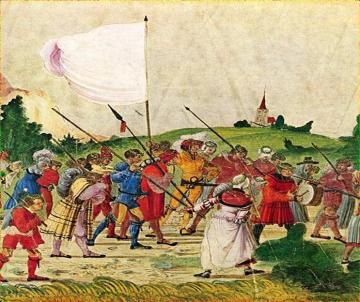Culture and Experience in the Age of the German Reformation

This network was funded from March 2014 to March 2016.
The German Reformation did not just remould ritual life and transform theology; it instigated an explosion of a variety of forms of cultural expression, from images, plays and music, moralising books, histories, and chronicles, through to material objects such as altar pieces, oven tiles, and clothes. In this way it created new modes of thinking about the world, and encouraged men and women to experience emotions, sexuality, time, and material culture in different ways. The aim of this network is to unite scholars working on diverse aspects of the Germany in the early modern period to understand these cultural experiences. Whilst existing scholarship has examined elements of this culture in isolation, as yet no major forum exists in which scholars across Europe and beyond can understand the implications of one another’s work. This network sought to aid the co-operation of history, music, art history, theology, and German language departments within Oxford and beyond.
Key Members
Professor Lyndal Roper (Oriel College, Oxford, History Faculty)
Dr Kat Hill (Oriel College, Oxford, History Faculty)
Dr Josh Teplitsky (St Peter's College, Oxford, Oriental Studies)
Dr Hannah Murphy (Oriel College, Oxford, History Faculty)
Dr Johannes Depnering (Oriel College, Oxford Medieval and Modern Languages)
Carla Roth (Balliol College, Oxford, History Faculty)
Edmund Wareham (Jesus College, Oxford, History Faculty)
Convenors:
Professor Lyndal Roper
Dr Kat Hill
Dr Josh Teplitsky
Dr Hannah Murphy
Dr Johannes Depnering
Carla Roth
Edmund Wareham
Culture and Experience in the Age of the German Reformation

- Outsiders in the Inner Circle: Jews, Christians, and Courtly Politics, Josh Teplitsky (Oxford) and Yair Mintzker (Princeton and Berlin)
- Laughter and Tears, Carla Roth (Oxford), Anna Linton (King’s College London), Adam Morton (Oxford) with Rebekka Habermas (Göttingen and Oxford)
- The Protestant Reformation and Collective Action, Steven Pfaff (Sociology: University of Washington)
- Session in the Ashmolean Museum with Timothy Wilson to look at the Wellby Collection
- Dissidents in Germany: 1670-1730, Lecture by Erik Midelfort (University of Virginia)
Gadi Algazi, "What is culture, anyhow?"
Lyndal Roper and Kat Hill, "Luther, Lutherans and Culture"
Susan Karant-Nunn, "The Goodness of Creation: Luther's Reconciliation with the Body"
Simeon Zahl, "The Insuperability of Anger and Lust in Luther’s Theology"
Beth Plummer, "Creating Lutheran Cultural Identity in Pluriconfessional Westphalian Convents"
Kat Hill, "Desire, Laughter and Revulsion in Later Lutheran Culture"
Matthew Laube, "Music, Identity and Material Culture in Lutheranism"
Philip Hahn, "Lutheranism and Sensory Perception"
Mirko Gutjahr, "Luther and Material Culture"
Roisin Watson, "Hodie Mihi, Cras Tibi': Funeral Monuments, Ritual and Print in sixteenth and seventeenth century Württemberg"
Bridget Heal, "Art and Memory in Lutheran Confessional Culture"
Natalie Krentz, "(Re-) defining the Holy: Space and Authority in Reformation Wittenberg"
Anna Linton, "Hans Sachs's Reformation Landscapes"
Martin Christ, "Catholic Cultures of Lutheranism"
Thomas Kaufmann, "Lutheran Confessional Culture on the Field of Global Mission"
Jenny Spinks, "Personalising Lutheran Wonders, Calvinism and the Devil in the Late Sixteenth Century"


